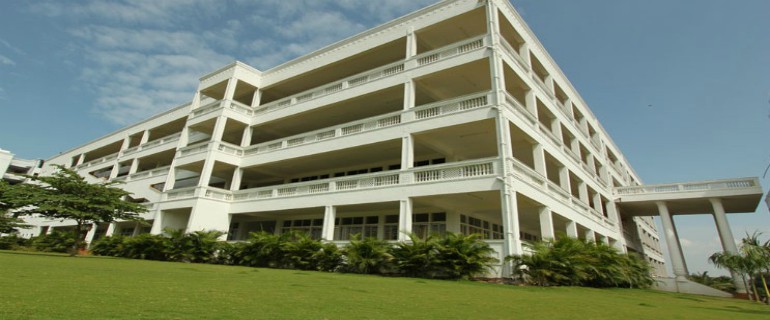Why Study in Mit Institute Of Design Apply Now
MAEER's MIT Institute of Design started its operations in August 2006, guided by the days leading minds in the Indian design education, with a plan to develop its identity as a research & training institution of highest international quality.
In pursuance of one of our future aspirations, we at the MAEER's MIT Institute of Design added a further dimension to the programmes of design learning at our campus. The concept of Design Habitat is in fact a logical and organic extension of our stated philosophy that ensures a total generalist ambience to enable design learning. It would evolve as an overarching concept around the functional framework of the Design Institute which remains an integral component of the Habitat.
It is into this kind of stimulating and inspirational environment that mentors from various design related disciplines are invited to interact with the design learners and challenge their young minds to explore newer territories that should complement and reinforce their ongoing design learning. Here are some of the disciplines from which these mentors would be selected: biomechanics, alternative energy systems, linguistics (semiotics), performing arts, plastic arts, design anthropology, sociology, perception and cognitive psychologies and several more. The mentors would ensure that the level of interaction is such that it eventually leads to a learning that is comprehensive, sustained and focused in depth, and directly or indirectly design related.
Distributing the course contents in form of projects is an obvious and time tested method. Each project would be formulated so as to necessitate participation of a mentor and one or two young aspirants pursuing the same discipline as the participating mentor. The team thus formed would be led by a member of the permanent faculty of the Institute. Sometimes the project might be so designed as to the participation of mentors from more than one discipline if needed. The enhanced scope of activities at the Design Habitat would also mean that we reinforce, within the present areas of learning at the Institute. To this effect, two new centers of advanced learning are being envisaged for the near future. The first is the Faculty of Architecture. The major emphasis here would be on humane and logical application of Twenty First Century technologies, arts and sciences toward solving the problems of human habitat in India. The second is a Centre for Theatre and Body Language. Even though it might seem to have been inspired by the Bauhaus Theatre of the 1930's, its major thrust would be on exploring the worlds of light and sound effects and ways of communication by means of body language.
Design education at MITID relies on a very thriving and vibrant culture where in the students organizes and participate in multiple activities that go beyond the academics. This not only helps them to become a well rounded professional but also a good human being who is response to its immediate socio-cultural environment. Some of the activities on the campus are as below
In a short span of 9 years MIT ID has emerged to be one of the best Product Design institutes in India. Similar to other premier Product Design Institutes in India, the product Design program at MIT ID is part of the Industrial Design discipline. It has been the earliest programs since the inception of Institute in 2006.
Transportation Design Courses
The learners of Transportation Design experience that the courses of study exclusively explore an inborn human need of human mobility. Beginning with the concept of transporting people and commodities using a variety of means, its emphasis moves on creating sustainable systems for Transportation Design.
Interior Space and Furniture Design Courses
Interior Space and Furniture Design discipline focuses on designing and planning of interior spaces for all kinds of human needs. The learners concentrate on designing spaces – interior and exterior - according to their functional hierarchies and interrelationships.
Graphic Design Institutes in India have been training candidates for a long time but most of them are very narrowly focused on imparting software application skills. These Graphic Design Institutes in India are unable to impart the sound theoretical and conceptual understanding that's required to be a professional graphic designer.
The learners of Retail and Exhibition Design find that the courses of study, besides concentrating on a rigorous learning of advanced graphic reproduction techniques, would also require them to gain an insight into creating images in the fourth dimension that is, moving images.
The Animation Industry in India is now going globally to create its own identity. It increases the demand for thinking minds and trained professionals like ‘Animators’. Animation Design course at MIT ID has always nurtured and mentored these thinking minds to face the challenges of tomorrow both in the global and local context. The objective of this programme is to prepare students to create solutions to complex problems in the field of Communication Design using animation as a creative medium. Thus, in this spirit, it is heavily aligned with the philosophy and concepts of Design pedagogy of MIT ID.
Film and Video Design Courses
Courses in Film and Video Design put emphasis on a strong narrative content. To communicate using the Film and Video media, one needs to use equipment like film and video cameras and editing systems. Moreover, conceptual processes in addressing the communication needs of the social and commercial sectors should also be rigorously followed. Of the many Film and Video design courses, the one at MITID emphasizes on the holistic learning.
Amidst the numerous fashion course that have mushroomed in all parts of the country. We offer the Indian students a rare opportunity to study on one of the University for the Creative Arts' (UCA) fashion courses in their native country. The BA (Hons) Fashion Design, degree will be awarded by University for the Creative Arts' (UCA), UK.
This unique and exciting course teaches the intellectual, practical and professional skills you need to succeed in a career in promotion and communication for the global fashion industry. You have the opportunity to learn the fundamental skills of research, experimentation and realization, as well as new practices and innovations within fashion promotion, communication and image generation.
Our ethos is based on the premise of promoting a creative and in-depth investigation of fashion in a social context. Irrespective of whether you engage in a practical exploration or a more theoretical, written exposition, you are encouraged to consider the critical and cultural context of your subject.
Fashion Management & Marketing
The M.Des Fashion Management & Marketing course prepares you for a fashion management career in the domestic or international fashion industry by delivering an innovative and relevant fashion business curriculum.
Working closely with fashion industry professionals, fashion organizations and industry role models and mentors, on the masters course you develop a diverse skill base that will enable you to have a wider, clearer and more relevant understanding of the business of management and marketing behind the fashion industry.
This course provides inside knowledge of industry strategies and cultures on a global basis combined with a strong grounding in key business skills including: finance; risk; leadership; organizational and change management; strategy; marketing and entrepreneurship.
In addition you also develop essential knowledge on industry management specific to fashion - strategic innovation and technology, product sourcing and supply chain management issues.
You benefit from being part of the multidisciplinary design environment at MITID, working alongside students on B.Des & M.Des. Fashion Design, along with Strategic Design Management.
The aim of the Program is to study concepts, methods, and techniques of information architecture, usability engineering, information Design, interaction Design, Visual Design, ethnography and Prototype engineering with focus on artifacts' where user experience is essential. Historically, usability has covered aspects as efficiency, learnability, etc.
M.Des in Design Management is a unique management program offered in a creative multi-disciplinary environment. Design is gaining importance as a fresh way of solving complex business problems and driving innovation. The program is built on strong foundation of design thinking and holistic business management. The program offers a mix of inputs on latest design methods and approaches and combines them with real life case studies and applications from the business world. The program builds the critical thinking and execution skills required in today’s worlds and prepare the learners to use design to solve real life problems faced by industry and society.


